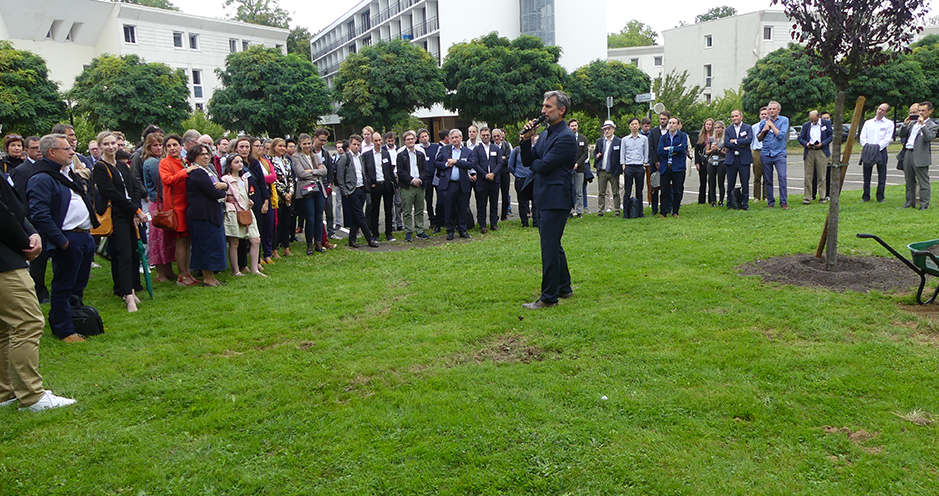ERC Summer School/PhD Finance Workshop, Part 2: Doctoral Research at a Cutting Edge
13 years after its first edition, the seventh PhD Workshop was dominated by the memory of its co-founder, Denis Gromb. But it was also a key moment for doctoral students from round the globe to present their research. Sponsored this year by ERC, these were four days of presentations and intense debates between and with world-class professors and students on the overarching 2023 theme, “Incentives in Finance”. With the dozens of attending doctoral students about to present their portfolio of research, we look back at the September workshop.
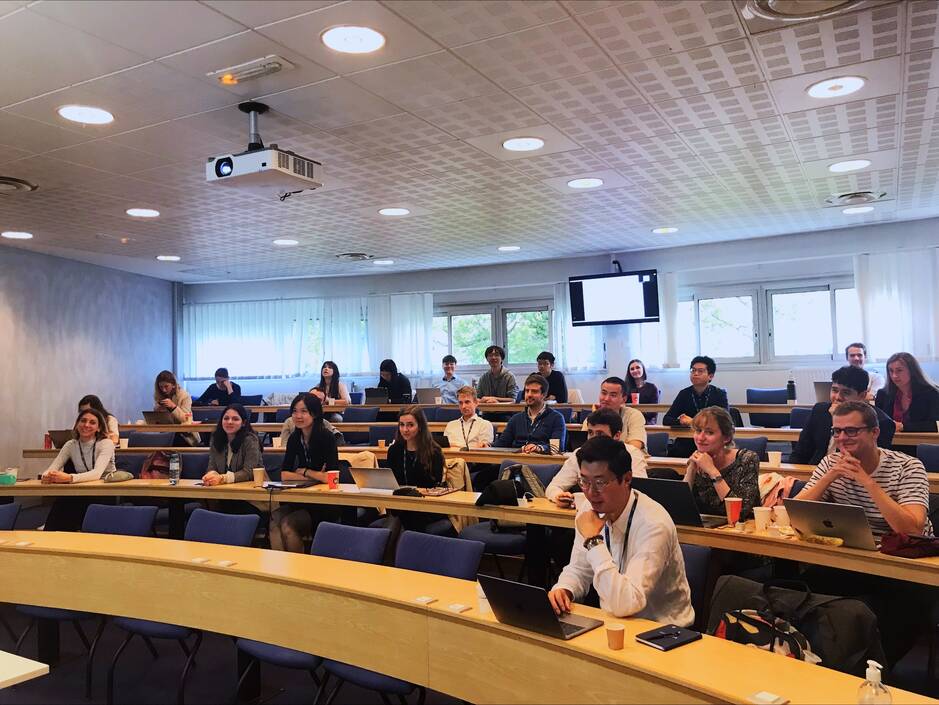
Doctoral students on Day 1 of the ERC-sponsored Finance workshop at HEC Paris
“Stochastic profitability”, “free-rider probability amongst shareholders”, “treasury debt maturity”, “fixed asset maturity”, “bond market creditor rights”, “paradox of profitability”… Just a few of the notions peppering the 28 academic papers presented at breakneck speed to a total of 140 people at the Summer School/PhD workshop in September. Yet, the lively exchanges both during and between the 10 sessions rarely seemed beyond the reach of non-specialists in finance. PowerPoints with an image of a pineapple pizza to illustrate the spillover effect of managerial taxes; or sound extracts as vocal indicators of future firm performances.
These were just two of several intriguing research approaches by doctoral participants which made for engrossing listening. The latter was delivered by Zihao Liu of Tilburg University: “I truly enjoyed the dynamic feedback from those gathered here,” he says after presenting his research on CEO vocal cues which, according to this budding researcher, could help to predict a firm’s performance. “The session was much more relaxed than I expected. Overall, I enjoyed hearing other doctoral candidates during these four days. But there were also some world-class speakers presenting their latest research. They showed us some powerful and clean models with beautiful parameters that are like a low-hanging fruit you can pick and work on for years. Truly inspiring.”
Maintaining a Decade-old Momentum
Such words were music to the ears of workshop co-organizers Daniel Schmidt, Bruno Biais and PhD student Teodor Duevski. Schmidt has been working hard with his fellow HEC academics to maintain the momentum of this unique event. The Associate Professor of Finance attributes this collective drive to its instigator Denis Gromb: “Denis created the PhD workshop when he was still a faculty member at INSEAD,” he says, “and it truly reflected his mentoring style: generous with his time, relaxed, encouraging, and always providing very constructive feedback. Having benefited immensely from this event when I was a PhD student myself, I felt it important to continue this tradition and I was therefore happy to co-organize the workshop together with my colleague Bruno Biais and our third year doctoral student Teodor Duevski.”
This annual event has come a long way since it was cooked up by the late Professor Denis Gromb (see Part 1) and a couple of his students during a car drive to the INSEAD campus in 2010. “And that first day of discussion ended late in the night over a meal in a popular Parisian restaurant,” confides with a laugh Imperial College professor Patrick Bolton at the end of this seventh annual workshop. “What hasn’t changed since that first exchange back in 2010,” he continued, “is what I would call the Denis style: no frills, straight to the point, so the exchanges are both informal and rigorous. Each paper is dissected: ‘What does that mean? Why do you apply such a theory in formulating such-and-such a model?’ We encourage these doctoral students to distil the essence of an idea and prune down the model. In that way, they emulate the applied theory Denis Gromb incarnated. He really was an artist in that respect.”
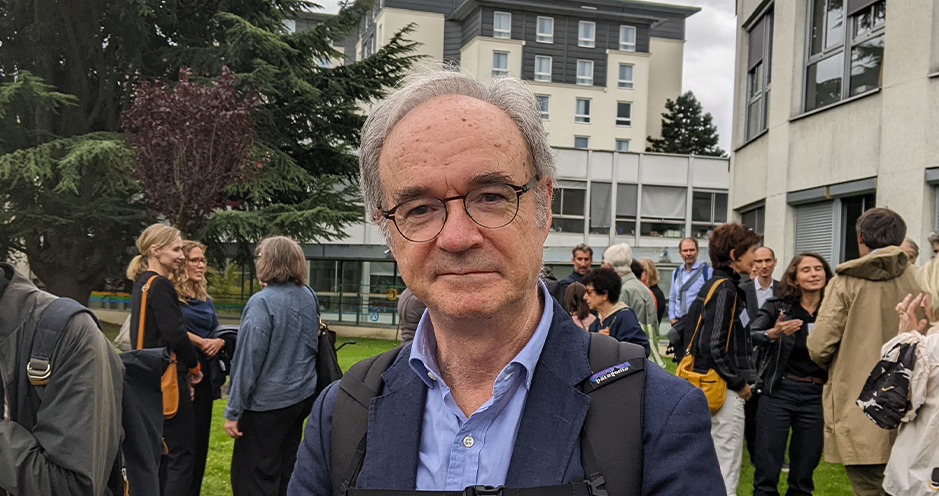
Stepping Stone for Final Year Candidates
Such rigor is precious advice for PhD students like Markus Bak-Hansen as he steers the treacherous waters of his final year. At the workshop, the HEC doctoral candidate presented a paper on dealer-customer relationships in Over-the-counter (OTC) markets in which securities are traded via a broker-dealer network (and not centralized exchanges like Euronext Paris (the “Paris Bourse”)): “This gathering feels like a safer environment because you present your early-stage research in front of an audience dominated by fellow-students. It’s also a space in which professors guide you with their remarks and probing. At the same time, it’s an opportunity to see what the competition looks like, to gauge your own work compared to others. Finally, I appreciate how much broader in scope it is than most workshops. So, all in all, this event helps propel us to the next steps of our careers as academics.”
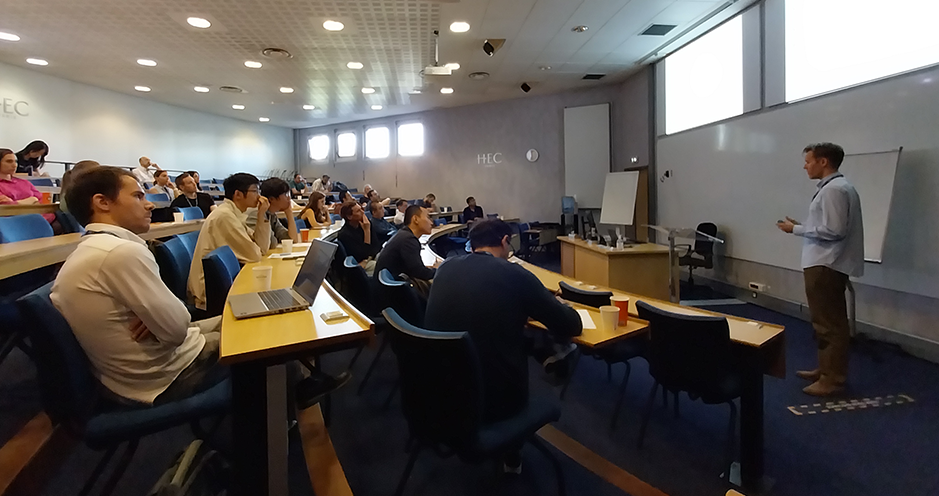
At the conference, Bak-Hansen’s work found its mark as he described the relationships between investment banks and customers in markets like bond and derivative markets: “There’s a very strong economic function for both parties,” he explains. “In practice, we now see large financial institutions like BlackRock or Vanguard tend to trade with investments banks across different asset classes. My research has been able to rationalize those functions.”
Having Skin in the Game
There were several stand-out moments, too many to detail here, in the presentations by the doctoral candidates who arrived from all horizons and garnered rich careers already. Taiwanese-born doctoral student Chia-Yi Yen, for example, is also an inventor of three Fintech patent applications, a translator of novels for children and a co-founder of a local NPO helping women to learn data science. Yen was at HEC to present her doctoral research on what she called “the dark side of co-investment”: “Co-investment is when fund managers invest their own money, so their incentive is aligned with the fund investor,” she explains. “Usually, we consider that the manager is on the same page as the investor. But my research in the US seems to indicate that there can be too much co-investment, and having skin in the game can incentivize the managers to cater to their own preferences and not those of the investors.” Yen focused on the period 2009-2015 during which time the American Taxpayer Relief Act of 2012 provoked what she calls a “clean shock” which increased capital gain tax by almost 9%: “But only for top earners. I used this event to see how this shock affected fund managers. It led me to conclude that these managers took too many risks that harmed investors’ performance. And that’s a problem.”
Indeed. Yen insists that most of the current literature focuses on the positive side of core investment. “I’m just trying to make the picture more complete,” she says modestly. “But there’s more work to be done on this negative side. The feedback I got at the workshop also pointed out a few technical errors I made. And those attending encouraged me to compare the risk-taking of a fund with its benchmark. All in all, there was very strong theoretical expertise that people shared with me suggesting, for example, that I incorporate the fraction of the co-investment of the fund manager into my model.” The student from University of Mannheim praised the constructive criticism she received at HEC: “Finance conferences can sometimes be a bit intimidating. But due to its informal nature this workshop felt very different and the feedback I got was super helpful.”
Robinhood and the New Investing Age
At the tail-end of the four-day workshop, LBS doctoral candidate Valeria Fedyk presented her research on a new type of retail investor in the United States, one who is investing on the Robinhood platform which accounts for a quarter of all retail trades. This is the first platform that has no commission costs and account minimums for investing, helping to revolutionize brokerage industry in the US: “But what makes the Robinhood platform special,” explains this specialist in behavioral finance and economics, “is that it’s catered well to a particular type of very young, capital-constrained and relatively inexperienced investor. My research can help us to become more aware of behavioral biases of these investors and if needed help them invest more rationally. Surprisingly, the research also suggests that these investors actually outperformed the market over the sample period, so they may not be as entirely unsophisticated as previously thought.”
Conclusions which Fedyk believes could have policy implications related to ways of further increasing household stock market participation and re-evaluate individual investor access to other asset classes. And the former visiting scholar at Yale University is convinced these conclusions are applicable to other countries than the US - if and when, they offer similar brokerage platforms. “And I think this is a likely development in the future.”
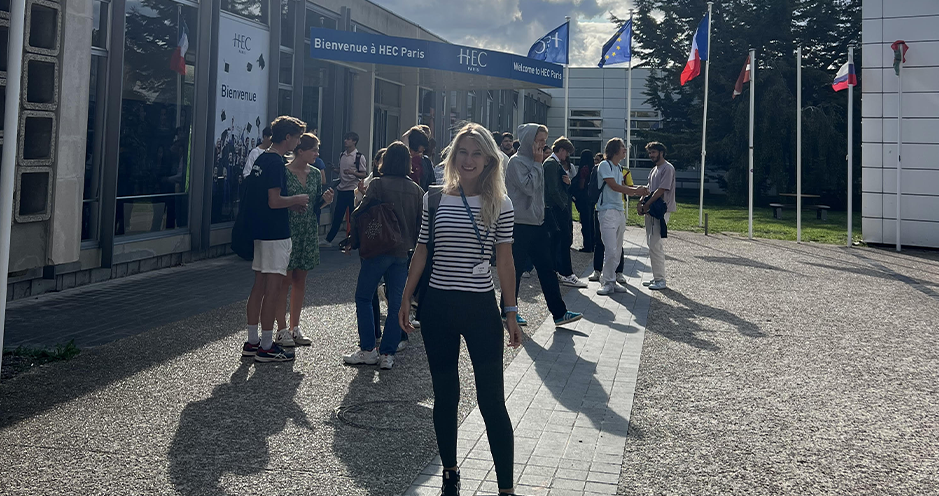
The Spirit of Denis Gromb
The quality of the feedback during the finance workshop marked one of the recent graduates from the HEC PhD program, Noémie Pinardon-Touati graduated last year thanks to her work on the interplay between government intervention and corporate financial and real behavior. “What I appreciate about this workshop is that it’s characterized by a great benevolence,” she says. “Faculty members from all over the world consider the work by these PhD students as meaningful and important. They take the time to provide important feedback to these candidates who are on the home stretch of a long academic journey.” Pinardon-Touati is now Assistant Professor at the University of Columbia after successfully defending her three chapters on government intervention and corporate behavior in June 2022. Due to the COVID 19 pandemic she could not fully enjoy all the financial workshops in her five years at HEC.
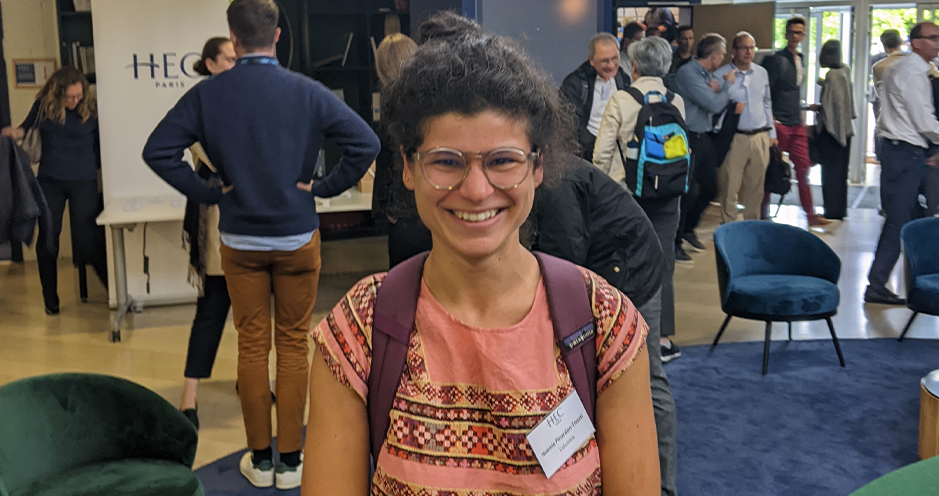
But she has was glad to make up for lost time, flying in from New York to kickstart her academic year. The 2023 edition had a special flavor for the French academic: “The homage to Denis during the workshop meant a lot to me. He always gave us students the space for personal as much as intellectual support. He was always extremely insightful with his comments. And yet our fields in finance basically had no link. I focus on empirical, corporate microfinance, whilst Denis was a theorist. It just shows his intellectual breadth and agility, which we saw in the day devoted to him during this year’s workshop. He saw that both empirics and theory share the same conceptual problems. So, it made Denis very good at seeing the depth and originality in each project, giving us confidence to go further.”
A small fruit tree in Denis Gromb’s memory now grows outside HEC’s Z building in honor of these qualities. As it grows, so will the annual Ph.D. workshop with its organizers committed to continuing the tradition its founder established in 2010. Some finance professors are already discussing the dates for the next workshop…
